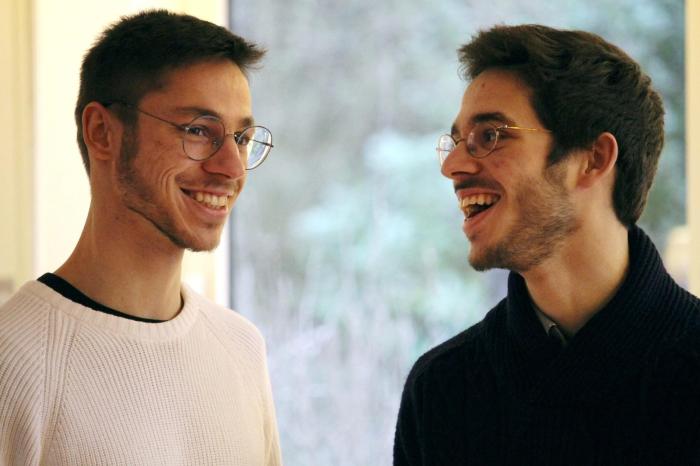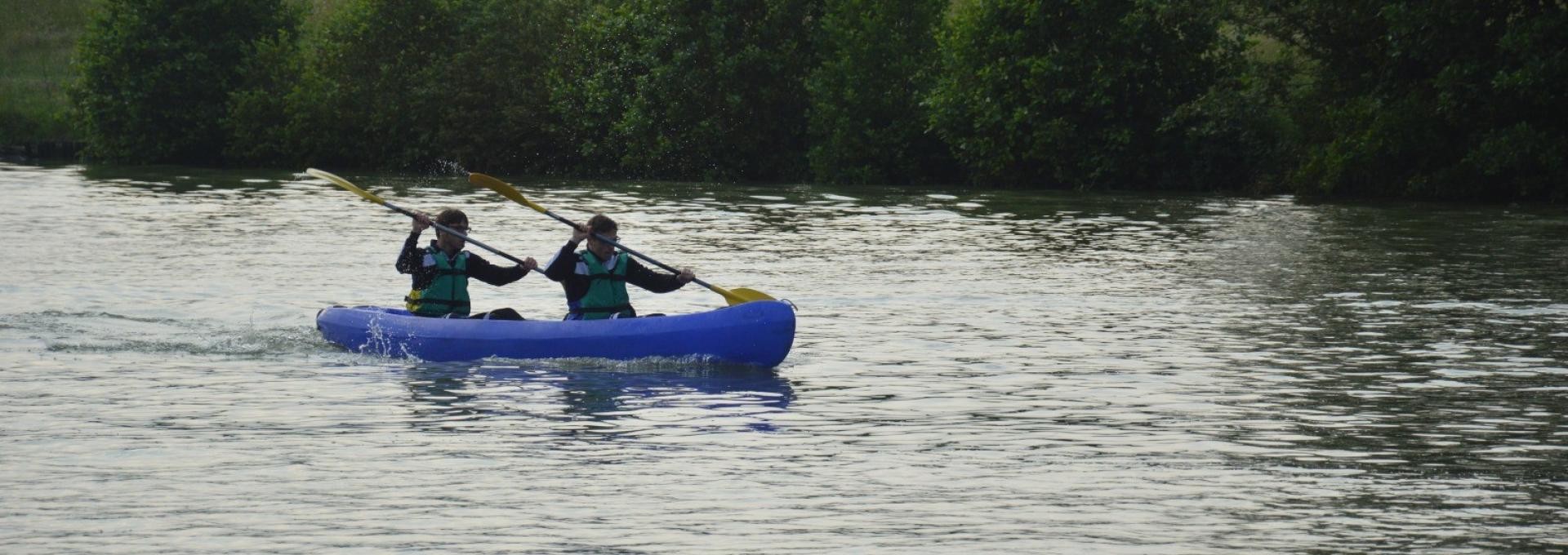What do the Bachelor of Science graduates do after the program? Let's find out!
Antonin and Louis-Maël are twins and both alumni of the Bachelor of Science! We wanted to know what it is like to study in the same program as your twin! And fun fact: their little brother is a current Bachelor student too who will graduate in 2023 😉

What made you choose the universities of Oxford and Cambridge?
Antonin: I chose the University of Cambridge first of all for its scientific excellence and its international recognition. I was looking at master programs in physics and Cambridge is one of the tops in the world and the best in Europe in this field. A third criterion was the language. I was particularly interested in universities from English-speaking countries and the UK was a perfect choice for me, being close to my family. I must say I was very surprised to go to the oral interview and even more to be admitted! This was truly beyond my hopes, but it shows that the University of Cambridge is accessible for students from the Bachelor of Science! Again, when applying for graduate schools, Louis-Maël and I didn’t expect to end up in the same country, in very similar universities, especially since we weren’t studying the same subject anymore! But there it is and it’s great because we again share a similar experience and can have a glimpse in our sister university!
Louis-Maël: The MSc I’m pursuing was advised to me by a professor in UC Berkeley where I did an exchange semester last year. I was very impressed by the immense variety of problematics that were studied in development economics and this MSc at Oxford soon became my first choice. I also liked the fact that the program was only one year long. Although this is certainly too short to fully experience Oxford, I value the flexibility it gives as of what to do next: I could easily carry on with a second master’s for example, or work for some time before coming back to academia.
What skills/knowledge gained during the Bachelor of Science have you been using in your current program?
Antonin: The most important thing the Bachelor of Science has taught me is to cope with a big workload and not being afraid of it. This is essential now since the MASt I’m pursuing is only a year and therefore goes very fast and requires a lot of autonomous work. The Bachelor Thesis was a very good preparation for the current research project I am doing. It taught me how to lead a project, plan my work, collect and analyse data and write a scientific report! My double major at l’X has given me confidence in my mathematical skills, which is essential in physics. It also allows me to follow the course on Quantum Field Theory which is taught by the mathematics department!
Similarly, doing the minor in Biology has increased my interest for that subject and has given me a good knowledge of the field. This is particularly useful for the course on Biological Physics. I had seen most of the biology content of the course and could therefore focus on the physics! This is a true asset of the Bachelor of Science of being able to do a double major and a minor! I would also like to mention that the Bachelor of Science was a very good preparation in terms of English for me. The University of Cambridge requires a high level of English for admissions and I don’t think I had that coming out of high school.
Finally, École Polytechnique has taught me not to give up sports at Uni despite the workload. I joined Cambridge’s athletics club for the 400m sprint discipline!
Louis-Maël: For economics students the Bachelor of Science offers a very solid quantitative background compared to other standard economics tracks. I realise this year how well I have been prepared by l’X and this allows me to focus on many other aspects of the program (writing skills, research, external opportunities). Besides pure knowledge, the Bachelor of Science has also taught me how to manage stress, tight deadlines and heavy workload which makes the pace of the MSc comparatively very manageable. I truly believe I couldn’t have had a better training for what I am doing right now.
When you entered the Bachelor of Science, did you already know what you wanted to do after the program?
Antonin: When I entered the Bachelor of Science, I already had a strong interest in Physics and knew I wanted to do the mathematics and physics double major. I didn’t know what would come next, but I hoped the Bachelor to be like a springboard to reach good graduate schools, which it ended up being! However, I didn’t know exactly what I would be studying whether physics, engineering or a related subject. I wasn’t thinking too much ahead knowing that my interests would be shaped by the program and three years of experience.
Louis-Maël: Not at all. I had a fairly good idea that I wanted to pursue in the Maths & Economics double major, but my plans for graduate schools were very blurry. In fact, I only discovered Development Economics a year ago. This is where I believe that the multidisciplinary courses offered by the Bachelor of Science are a real asset: I always knew that several doors were opened for graduate school.
What memories do you have of your time spent at l'X and in the Bachelor program?
Antonin: I keep excellent memories from my time at l’X. I liked the fact of being a small cohort (~70 students) and all living in the same place. This created strong bonds and a good cohesion. Apart from the demanding academic work which I had expected, l’X offered me plenty of opportunities and experiences. I would like to mention three:
- The running trainings with our former Coach Fred were absolutely amazing. More than just a break from studying, they were real life lessons. He made us give our best to push back our limits, endure through the difficulty and build a strong team spirit!
- During our semester break in the first year, we went to a military training centre in the Pyrenees. These four days were extraordinary. We discovered the life and training of the French military and could even experience it ourselves (in a softer version). We did great team building activities and we learned to know ourselves and our classmates better than ever.
- Finally, I sang one term with the school’s choir and we gave a concert in the church La Madeleine in Paris which was an extraordinary experience.
Louis-Maël: I have many memorable moments. I think when a program is that intense the friendships you build are particularly strong leaving you with plenty beautiful memories. For our promotion the trip to the “Centre National d’Entraînement Commando” in Mont-Louis was certainly a big highlight. (See Antonin's answer for details).
As a memory of the Twin Team I remember a nice barbecue at the end of the first year with a kayak competition organised as part of the afternoon. We decided to compete as a team and ended up winning the little race: I guess we managed to coordinate as twins ! Other great memories include concerts with the University Orchestra or running trainings with “Coach Fred”. In fact this is the only setting where we went really competitive against each other: Antonin mostly beat me on uphill and staircase trainings while I was ahead on long distance running.
What are your ambitions for the future?
Antonin: The Bachelor of Science has given me a multidisciplinary education and I would like to keep that aspect in my future career. I plan to specialise in medical physics, that is physics applied to the medical field. Physics is very large, and it was hard for me to choose a subject to specialize in. I explored plasma physics in a summer internship, and fluid dynamics for my Bachelor Thesis. However, I wanted to take advantage of my minor in biology and that’s how I converged towards medical physics. I’m interested to help develop new technologies for the medical field and ultimately help people and society. I’d like to do research with a close link to the industry and medical doctors.
Louis-Maël: One of the things I more deeply realised when starting the MSc in Oxford is the importance of making people benefit from the things I could learn. I haven’t chosen where I was born and which education my parents could afford for me: this is an immense privilege but, as Esther Duflo says, it also comes with a great responsibility. I do not want to keep this for myself. My ambitions for the future? Being at a place where I can help and try to have a positive impact on people’s lives especially in lower-income countries. Working at the World Bank, the UN, NGO’s or other organisations that do development are all options I have in mind.
Any advice to current Bachelor students when deciding about the pursuit of their studies?
Antonin: Think whether you would like to be closer to the industry or academia. Are you interested in fundamental science and research? Do you prefer theoretical problems or applied ones? What topic in your majors excites you the most? These are a few of the questions that helped me in my study choices. When choosing a university, look at the courses they offer and if they are specialized in your field of interest. Maybe they have the best professor in that field! Beware that most of the master’s programs in the UK are only one year long which means you would need to think about what’s next and make applications as soon as you start! Also, applications in the US and Canada close as early as December! Don’t hesitate to aim high in your applications! You will be surprised what you can reach!
Louis-Maël: Don’t be afraid to apply to prestigious universities! In only three years you will have graduated with a double major, perhaps a minor, having carried out an extensive research project (Bachelor Thesis) and having possibly even been abroad. Regardless of your actual results, these simple facts are tremendous assets and testify that you are able to cope with intense, broad and highlevel academics. So, don’t hesitate to apply to some of your dream universities: you will be a strong candidate. Also stay very open minded. It will be appreciated if, as an economist, you know what coding or physics is about. The multidisciplinary that is proposed by the Bachelor of Science is an immense asset that you should take advantage of.
This is the second and last part of their interview. The first part is available here!
